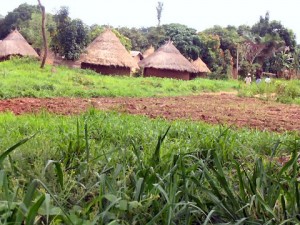Hibernation is a state of inactivity that is characterized by low body
temperature, slow breathing, heart, and low metabolic rate. Associated with
cold temperatures, the purpose is to conserve energy when food is scarce. To
achieve this, hibernating animals slow their metabolic rate, resulting in a
decreased body temperature. Hibernation may last several days, weeks, or
months, depending on the species, temperature, time of year and other
conditions.
In a way, Nigeria’s farmers are in a state of hibernation: Apart from
the few who are fortunate enough to live in areas where irrigation facilities
exist and who have the skills and equipment to engage in dry season farming,
most of Nigeria’s 80 million farmers are practically hibernating at the moment.
After working energetically to gather food during the rainy season, they spend
the rest of the year engaged in almost no productive activity.
In this day and age, and considering Nigeria’s vast potentials in
irrigated agriculture, this is nothing short of criminal waste and negligence.
And to indicate the confusion in the agricultural sector, no one can tell you
how many farmers there really are in Nigeria.
Last week while defending his ministry’s plan to spend billions of naira
to distribute 10 million phones to farmers in rural areas, the Minister of
Agriculture, Dr. Akinwumi Adesina said, “Nigeria has 110 million cellphones,
the largest in Africa. But there is a huge divide: the bulk of the phones are
in urban areas. The rural areas are heavily excluded. For agriculture, which
employs 70% of the population, that means the farmers are excluded and
marginalized. In today’s world, the most powerful tool is a mobile phone. As
Minister of Agriculture, I want the entire rural space of Nigeria, and farmers
to be included, not excluded, from advantages of mobile phone revolution.”
One problem is, going by the minister’s math, 70% of 160 million is
closer to 112 million. So does Nigeria have 112 million farmers? In reality,
the problem of Nigerian farmers is not mobile phones or even electronic access
to markets: When farmers spend about half of the year doing nothing, and after
they take out from their stocks to feed their families, what would be left to
take to markets? And assuming the markets are ready, where are the roads to
convey the produce to the markets before they perish?
How can Nigeria’s agricultural output grow when our farmers (is it 80 or
112 million?) still depend largely on rain-fed farming? In other words, our
farmer only work during the rainy season and spend the rest of the year
practically hibernating, save the few who migrate to urban centres to seek work
as seasonal labourers. When rains fail as they occasionally do, or when
flooding occurs, farming for that year is ruined.
And it is not as if government is not aware of what needs to be done.
The Minister of Water Resources, Sarah Ochekpe recently spoke about plans to
attain food security in Nigeria, explaining that government had concluded plans
to rehabilitate irrigation projects across the 36 states of the federation.
“For a start, we have already identified 57 irrigation projects across the
country for investment by the Federal Government. These are critical facilities
that we must pay attention to; certainly we cannot achieve food security
without irrigation development”.
The problem, again, is that since the Ministry of Water Resources was
established some 40 years ago, practically all the ministers have repeated the
same thing. The truth is that Nigeria has not had the discipline to design and
implement a workable irrigation master-plan that would keep our farmers busy
all year round, producing food not only for local consumption, but the
international markets as well.
Without putting this foundation in place, Dr. Adesina’s mission to “arm
them (farmers) with modern information systems . . . connecting to supermarkets
and international markets require that farmers know and meet stringent
consumer-driven grades and standards” will amount to building a superstructure
without a base.
It is true that the availability of water varies tremendously but even
with limited water supplies, irrigation can vastly increase agricultural
productivity. Underused water resources in Nigeria offer great potential for
irrigation, especially using simple and inexpensive methods, but over the
years, our dependence on rainfall has remained a major constraint to
agriculture and poverty reduction. The vulnerability of our food security is
significant because of the combination of highly variable and erratic rainfall
and poor development of irrigation. Other constraints include poor management
skills and markets, unfavourable land and water policies and poor access to
credit by the farmers who need it.
Increased irrigated agriculture is a key to reducing poverty. Nigeria
must recognize the value of irrigation in job creation, poverty eradication and
food security. With irrigation, Nigeria may earn more foreign exchange than we
do from oil and other minerals combined. Millions of jobs would be created and
food security enhanced. Many environmental challenges would be mitigated and we
will be weaned of our lethargic, short-sighted dependence on crude oil exports.
-KANDE ADDA DANJUMA
KUW/U14/SLG/2002

No comments:
Post a Comment